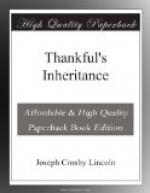“John, Emily—”
“Hush! I like you, Captain Obed. I don’t wish to quarrel with you. Take my advice and omit that young lady’s name.”
Captain Obed made one last appeal.
“John,” he pleaded, desperately, “don’t! I know you’re sort of—sort of tied up to Holliday Kendrick; I know you feel that you are. But this ain’t a question of professional honor and that kind of stuff. It’s right and wrong.”
“Is it? I think not. I was quite willing to discuss the rights and wrongs, but I had no—however, that is past. I was informed last night, and in your hearing, that the question was to be purely a matter of legal skill—of law—between Daniels and myself. Very well; I am a lawyer. Good morning, Captain Bangs.”
The captain left the office, still protesting. He was hurt and angry. It was not until later he remembered he had not told Kendrick that Heman Daniels must have spoken without authority when he declared himself the chosen representative of Mrs. Barnes and Emily in all matters between the pair and John. Heman could not have been given such authority because, according to Thankful’s story, she and Miss Howes had immediately gone upstairs after leaving the living-room. Daniels could have spoken with them again that evening. But when Captain Obed remembered this it was too late. Thankful had asked Mr. Daniels to take her case, provided the attempt at ousting her from her property ever reached legal proceedings. And Emily Howes left East Wellmouth two days later.
She had not intended to leave for South Middleboro so soon; she had planned to remain another week before going back to her school duties. But there came a letter from the committee asking her to return as soon as possible and she suddenly announced her determination to go at once.
Thankful at first tried to dissuade her, but soon gave up the attempt. It was quite evident that Emily meant to go and equally certain, in her cousin’s mind, that the reason for the sudden departure was the scene with John Kendrick. Emily refused to discuss the latter’s conduct or to permit the mention of his name. She seemed reluctant even to speak of the Holliday Kendrick matter, although all of East Wellmouth was now talking of little else. When Mrs. Barnes, driven to desperation, begged her to say what should be done, she shook her head.
“I wish I could tell you, Auntie,” she said, “but I can’t. Perhaps you don’t need to do anything yet. Mr. Daniels says the idea that that man can force you into selling is ridiculous.”
“I know he does. But I’m a woman, Emily, and what I don’t know about law would fill a bigger library than there is in this town by a consider’ble sight. It’s always the woman, particularly a widow woman, that gets the worst of it in this kind of thing. I’d feel better if I knew somebody was lookin’ out for me. Oh dear, if only Mr. John Kendrick hadn’t—”
“Auntie, please.”




